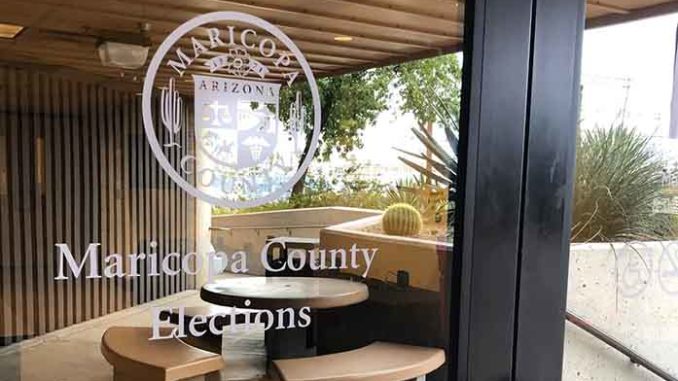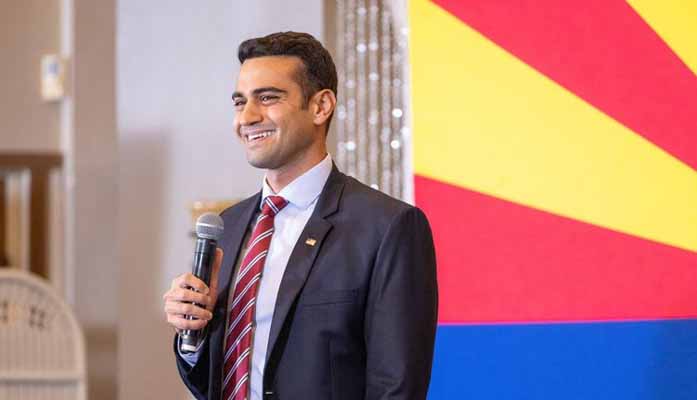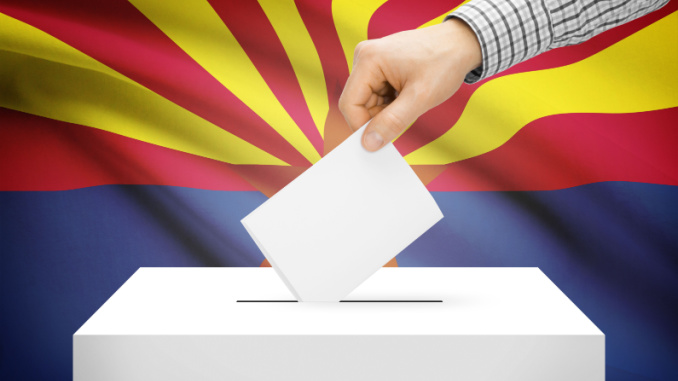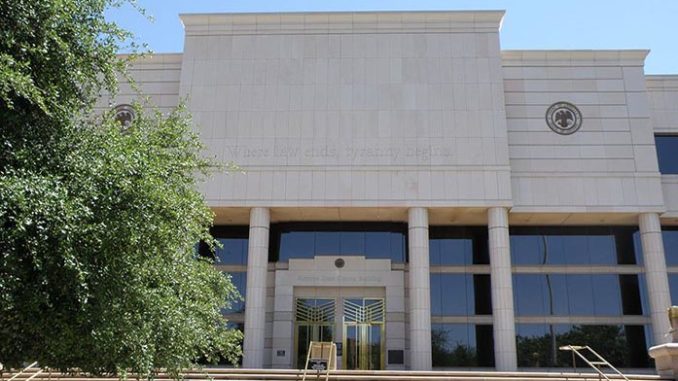
by Staff Reporter | Feb 5, 2025 | News
By Staff Reporter |
Election volunteers will be allowed to observe signature verification processes in Maricopa County up close for the first time.
Maricopa County Recorder Justin Heap announced the “common-sense” policy change on Monday. The recorder said the observers won’t have access to the party affiliation of voters.
“This change allows bipartisan election observers into the Signature Verification room to more directly observe the Signature Verification process,” said Heap. “This is one of the first of many commonsense improvements to make Maricopa’s election processes more trustworthy and transparent.”
In order to protect the party affiliation of voters, Maricopa County won’t display political parties or any “personally identifying data” on the signature verification screen. This change will take effect with the May 2025 elections, per the recorder’s office.
Heap revealed in Monday’s press release containing the policy change announcement that previous recorder administrations hadn’t been fully honest about election workers’ abilities to access voters’ party affiliations and personal identifying information. Per Heap, all election workers had to do to access that information was scroll down on their screens during signature verification processes.
“Previously, voters were assured by election officials that no party or personally identifying data was available to signature verifiers,” said Heap. “In my review of our election processes I have discovered this was not the case. Signature verification workers who scrolled down the page would still see this information on the scans of older ballots.”
Prior to Heap’s administration, election volunteers weren’t permitted to observe signature verification processes. In the accompanying press release issued on Monday, the recorder’s office claimed that the previous policies requiring signature verification observation to take place from an adjacent hallway some distance from the work “made meaningful observation of the process impossible.”
“Removing that data will accomplish two important things: it brings bi-partisan observers back into the room to scrutinize the process and ensures that verifiers do not know the party affiliation of the voters whose signatures they are verifying. This will be the first of many commonsense improvements we will be making to ensure that future elections in Maricopa County are run in a trustworthy, transparent, and efficient manner,” concluded Heap.
Ahead of the presidential election last year, the state established the first legally binding signature verification rules as part of necessary modifications to election dates made to comply with the shortened electoral count deadline.
Those signature verification rules (contained within HB 2785) require the rejection of early ballot envelopes bearing signatures that don’t match the voter’s registration or records. Beginning next year, voters may bypass the signature verification requirement by showing their ID while returning their early ballot in person. Other Republican-led aspects ensuring stricter signature verification were stripped from the bill following negotiations with Democratic lawmakers and Governor Katie Hobbs.
Improving signature verification processes was a top priority for Heap during his campaign to oust then-incumbent Stephen Richer. Heap attested during his campaign that the county’s standards for signature verification were too lax based on his personal experiment with the process.
AZ Free News is your #1 source for Arizona news and politics. You can send us news tips using this link.

by Matthew Holloway | Oct 29, 2024 | News
By Matthew Holloway |
In partnership with the Republican National Committee (RNC), Republican Congressional candidate for Arizona’s 8th District Abe Hamadeh has issued a letter to Maricopa County Recorder Stephen Richer. In the letter, Hamadeh and the RNC called for an emergency meeting with the county election officials to review what they described as a “flawed Election Plan.”
In a post to X sharing the letter, Hamadeh wrote that the plan, “fails to account the time voters need to complete the FOUR-PAGE ballot, setting the stage for long lines & chaos on Election Day. I won’t tolerate an election system that disenfranchises the will of the people.”
In the three-page letter from Hamadeh and RNC attorney Harmeet Dhillon, they wrote, “We have received information indicating that voters will take significantly longer to complete their ballots than the estimates upon which the Maricopa County Election Plan is based, specifically the provisions related to Election Day voting. Our observations in the field confirm this concern.”
The letter explains, “The county’s current plan, which already expects long lines on Election Day, is based on the unlikely expectation that voters will only take up to a maximum of approximately 12 minutes to complete their ballots. Our information is that voters will take, and are now taking substantially longer to complete their ballots—averaging at least 15 minutes with a maximum that his much higher.”
Dhillon and Hamadeh further pointed out that there has been a significant decrease in the number of voting centers near Paradise Valley Community College, noting that the area has one of the highest turnout rates in the county.
They added, “This will mean dramatically longer lines than expected on election night. As you know, many voters will not be able to endure an hours-long wait to vote, effectively disenfranchising them if the lines grow too long.”
As previously reported by AZ Free News, there has been a serious decrease in the amount of polling centers made available to the county election officials due to limitations in security features and concerns over potential violence and damage in the 2024 election. In the area served by one Phoenix area school district, the number of polling stations has dropped from 17 to one, housed in a secured District office replete with barbed-wire fencing, security gates, and badge-only access, “one step below Fort Knox.”
According to a study from the America First Policy Institute, an analysis of precinct-level data in six Arizona counties from the 2022 election in Arizona revealed “some precincts where there were more ballots being counted than there were registered voters listed as casting ballots and some precincts where the reverse occurred,” as printing errors and long-lines plagued polling centers throughout the state. The total number of discrepancies was well over 8,000 ballots. And as the AFPI notes, the race for Attorney General, in which Hamadeh was defeated, was decided by a razor-thin margin of 280 votes.
The 2022 issue and potential 2024 problems could be quite similar as Yavapai County’s Registrar of Voters Office explained to the Institute’s researchers:
“If a voter checks in on Election Day but walks out with their ballot (does not put it in the ballot box), they will be listed as voted because they signed the register but there will not be a ballot to tabulate.”
Matthew Holloway is a senior reporter for AZ Free News. Follow him on X for his latest stories, or email tips to Matthew@azfreenews.com.

by Staff Reporter | Oct 1, 2024 | News
By Staff Reporter |
Maricopa County Recorder Stephen Richer and State Senator Ken Bennett filed amicus briefs in defense of a Ranked Choice Voting (RCV) ballot initiative with the Arizona Supreme Court last week.
Bennett served as the secretary of state from 2009 to 2015. He filed his brief jointly with Helen Purcell, the former Maricopa County recorder who served nearly 30 years.
Richer said in his filing for Smith v. Fontes that the votes should be counted for RCV, or Prop 140, the “Make Elections Fair Act” — regardless of the existence of a disqualifying number of duplicate signatures gathered — because the “election has already begun” and, he says, state law prohibits the prevention of counting votes cast.
“Hiding the results or attempting to prevent the vote from being tabulated is an inequitable result,” said Richer. “And it is at odds with Arizona public policy that demands government transparency. Not counting the vote does not mean it did not happen.”
Richer said all arguments concerning the initiative’s qualifications to be on the ballot were rendered moot after the deadline passed to certify and print the ballots.
“To be resolved with a high degree of certainty may not be currently possible given the election time constraints,” said Richer. “The issue has now, at least partially, gone to the people. The Recorder believes there is benefit to allowing the vote to occur, and assuming it is otherwise constitutional, to count.”
Richer stated that his office had already printed over 21,500 different ballot styles and mailed many of them out to in-state residents as well as military and overseas voters, some of which have been returned: over 1,100 out of about 8,500.
“Recorder submits that once the ballots are printed, the time for signature challenges must end,” said Richer.
Richer also said that state law prohibits the destruction of any public record of a vote, and that Maricopa County’s tabulation machines would tabulate the votes returned.
The recorder noted that state law does allow for courts to enjoin the certification and printing of ballots, but not the power to enjoin the counting of votes.
“[I]f the voting tally is a public record, the Recorder does not see how Maricopa County can either destroy it or fail to release it,” said Richer.
Similarly, Bennett and Purcell argued that their combined expertise on elections made it clear that timeliness in elections takes precedence over validity.
Bennett and Purcell cited court precedent in their argument of mootness regarding the challenge to Prop 140’s validity. Secretary of State Adrian Fontes instructed county election officials to include Prop 140 on their ballots printed in late August.
“Courts have consistently upheld the principle that pre-election challenges must be resolved before the ballot printing deadline,” said the pair. “[And] as a practical matter, invalidating Prop 140 after voting has already begun would result in electoral chaos and damage voter confidence in the efficacy of their votes.”
That ballot printing deadline occurred a day after the Arizona Supreme Court remanded the case to the Maricopa County Superior Court for review, citing the exclusion of evidence pertaining to 40,000 duplicate signatures. The exclusion of those contested signatures reduce petition signatures to what is below the total required to qualify for the ballot.
Though the Maricopa County Superior Court did find that nearly all of the 40,000 signatures were duplicates, the court ruled that the state constitution didn’t allow for those votes cast on Prop 140 to be ignored. That ruling led to the appeal which the Arizona Supreme Court now considers, and with which Richer and Bennett disagree.
AZ Free News is your #1 source for Arizona news and politics. You can send us news tips using this link.

by Matthew Holloway | Sep 25, 2024 | News
By Matthew Holloway |
In a series of posts to ‘X,’ Maricopa County Recorder Stephen Richer reported via his personal account that his office has received the first batches of ballots under the Uniformed and Overseas Citizens Absentee Voting Act (UOCAVA ). According to Richer, “The 2024 General Election is officially underway here in Maricopa County!”
In full he wrote, “We’ve already received back 200 Uniform and Overseas ballots. The 2024 General Election is officially underway here in Maricopa County!”
Richer also reported via X that the Recorder’s Office now has “three remote recording kiosks up and running,” sharing the locations as the Sun City Library, the Southeast Regional Library in Gilbert, and the Georgia T. Lord Library in Goodyear.
He followed up with the Maricopa County Active Voter Registration Totals as of Monday totaling 2.512 million registered voters: 883,494 Republicans, 868,825 Independents, 719,324 Democrats, 19,5226 No Labels Party, 18,715 Libertarians and 2,120 Green Party.
According to a Monday press release from Maricopa County Elections:
- Maricopa County Elections is expecting a total turnout of 2.1 million voters.
- It is expected that half of voters will do so by voting early by mail and the other half will vote early in-person, drop off an early ballot, or cast their ballot in-person on Election Day.
- Approximately 315,000-420,000 voters are expected to visit a Vote Center on Election Day.
- 246 Vote Centers will be opened, and more than 3,000 election workers will be hired to service voters.
On the 2024 ballot, voters will decide 144 elected offices, 45 judges up for retention, and 76 ballot measures of which 13 are statewide propositions.
Jennifer Liewer, Deputy Elections Director for Communications, advised, “With a two-page ballot, containing contests on the front and back of both pages, it is more important than ever for voters to do their research ahead of time. Voters may also want to make a plan to either vote early by receiving a ballot in the mail or vote early in-person at a Vote Center to avoid longer than normal lines on Election Day.”
Since his ouster as Recorder, Richer has touted his recent lengthy interview with TIME in which he repeated his claims that “the 2020 election wasn’t stolen,” calling this view “a documented fact,” despite the hotly disputed status of the claim at the highest levels of the GOP. The outgoing County Recorder was defeated in the Republican Primary by Arizona State Rep. Justin Heap who ran on a platform to “Restore Voter Confidence.”
During a forum presented by the Citizens Clean Elections Commission, previously reported by AZ Free News, Heap made serious accusation against Richer that election rules were not followed and vocally defended Arizonans’ right to be skeptical about election results. He said that legal safeguards weren’t followed and that the signature verification process for mail-in ballots was “inadequate.”
“I do not trust the system as it is currently being operated,” Heap added.
Matthew Holloway is a senior reporter for AZ Free News. Follow him on X for his latest stories, or email tips to Matthew@azfreenews.com.

by Matthew Holloway | Sep 24, 2024 | News
By Matthew Holloway |
The Arizona Supreme Court ruled on Friday that nearly 98,000 Maricopa County voters whose citizenship documents got caught up in a coding error will be allowed to vote full ballot in November. Maricopa County Recorder Stephen Richer had moved to have them relegated to voting ‘Fed Only’ in November.
The court received several amicus briefs from voters and organizations across the political spectrum arguing against the move, including the Arizona Republican Party; the League of Women Voters of Arizona; Coconino County Recorder Patty Hansen and Pima County Recorder Gabriella Cazares-Kelly; as well as the Carlos Apache Tribe, Living United for Change in Arizona, League of United Latin American Citizens of Arizona, Mi Familia Vota, and the ACLU of Arizona.
The Republican Party of Arizona (AZGOP) filed an amicus brief Thursday calling upon the court to intervene and prevent the removal of 98,000 voters from the rolls whose registrations were potentially endangered by a controversial clerical error by state officials.
On Tuesday, Arizona’s Democrat Secretary of State Adrian Fontes announced that 97,000 inividuals would be impacted by an error that could prevent them from voting in state-level elections such as state legislative races, initiatives, and referenda. The error affects voters who were issued an Arizona driver’s license prior to October 1, 1996. The figure represents over 2.5% of the state’s total registered electorate. The outlet noted that a technical issue reportedly caused the error which has been resolved, however, the status of those affected is unclear.
In a statement published Thursday the AZGOP announced:
“Today, the Republican Party of Arizona filed an amicus brief in the Arizona Supreme Court supporting the preservation of voter rights in the case involving nearly 100,000 voters whose registration statuses were jeopardized by a state government clerical error.
The AZGOP urges the court to protect voters from sudden disenfranchisement and argues that the requested relief from Petitioner Maricopa County Recorder Stephen Richer violates both state and federal law.
The AZGOP’s amicus brief notes the importance of adhering to the National Voter Registration Act (NVRA), which prohibits systematic voter removals within 90 days of a federal election, and argues that the removal of voters based on this clerical error violates due process and the U.S. Constitution. The AZGOP maintains that any action taken to correct these registration issues should not result in the disenfranchisement of voters who have long participated in Arizona’s elections without issue.”
Gina Swoboda, AZGOP Chair said in a statement:
“Regardless of any outcome on this matter, all of these voters will receive a Federal Only ballot which permits them to vote for President, U.S. Senate, and U.S. Congress. The only question before us is if these voters, who have possessed an Arizona driver’s license since before October 1996, should be denied the right to vote for their representatives in the Arizona legislature, county, school board, and ballot measure contests.
Our brief makes it clear: nearly 100,000 Arizona voters should not be penalized for a mistake made by the government. We will not stand by as voters are disenfranchised, especially so close to an election. The law requires that any changes to voter registration or eligibility must be handled carefully and in accordance with federal and state law. Rushing to disenfranchise voters now would not only be illegal but would severely undermine confidence in our elections.”
In a lengthy post to X, Richer justified his lawsuit saying:
“My office discovered this issue last week, and we have been working with the Governor’s Office, the Secretary’s Office, the MVD, and the Attorney General to fix this moving forward. The number is about 97,000 registrants across the state. All of these people have attested under penalty of law that they are U.S. citizens. And, in all likelihood, they almost all U.S. Citizens. But they have NOT provided documented proof of citizenship. Moving forward (2025 onward), everyone agrees we need DPOC for those voters for them to vote a full ballot. But the Secretary and I have different opinions on what the law requires for the November 5, 2024 General Election. It is my position that these registrants have not satisfied Arizona’s documented proof of citizenship law, and therefore can only vote a ‘FED ONLY’ ballot.”
In the text of the amicus brief, the AZGOP argues that the declaratory judgment requested by Maricopa County Recorder Stephen Richer would stand in violation of both the First and Fourteenth Amendments to the U.S. Constitution, Arizona’s Free and Equal Elections Clause, as well as the National Voter Registration Act. The party’s legal team explained, “It is difficult to imagine state action that would impose a more ‘severe’ burden on the right to vote than abruptly informing an individual who has lived and voted in Arizona for decades—and previously voted in all elections, state and federal—that they must suddenly prove that they are a U.S. citizen in the handful of days remaining before Arizona’s October 7 voter registration deadline if they want to vote in state elections this year.”
Chief Justice Ann Scott Timmer writing for the majority ruled:
“In sum, Richer has not established that the county recorders have statutory authority to remove the Affected Voters from being able to vote in the upcoming 2024 General Election for federal offices and with respect to matters on an Arizona ballot. This is particularly true under the present facts, where a state administrative failure permitted the Affected Voters to be registered without confirming that they provided DPOC when they received their driver’s licenses and where there is so little time remaining before the beginning of the 2024 General Election.”
She continued, “Arizona law provides that ‘[w]hen the county recorder obtains information pursuant to this section and confirms that the person registered is not a United States citizen,’ the county recorder is to initiate a process to cancel a registration that includes sending the person notice that the person’s registration will be canceled in thirty-five days unless the person provides satisfactory evidence of United States citizenship. A.R.S. § 16-165(A)(10). Although challenges are pending to various aspects of the statute, subsection (A)(10) recognizes the right of any voter to notice and an opportunity to contest any determination of a voter’s ineligibility. A county recorder can therefore proceed with respect to individual voters under § 16-165(A)(10) as long as the provision’s due process requirements are followed… Regardless, we are unwilling on these facts to disenfranchise voters en masse from participating in state contests. Doing so is not authorized by state law and would violate principles of due process.”
Matthew Holloway is a senior reporter for AZ Free News. Follow him on X for his latest stories, or email tips to Matthew@azfreenews.com.





